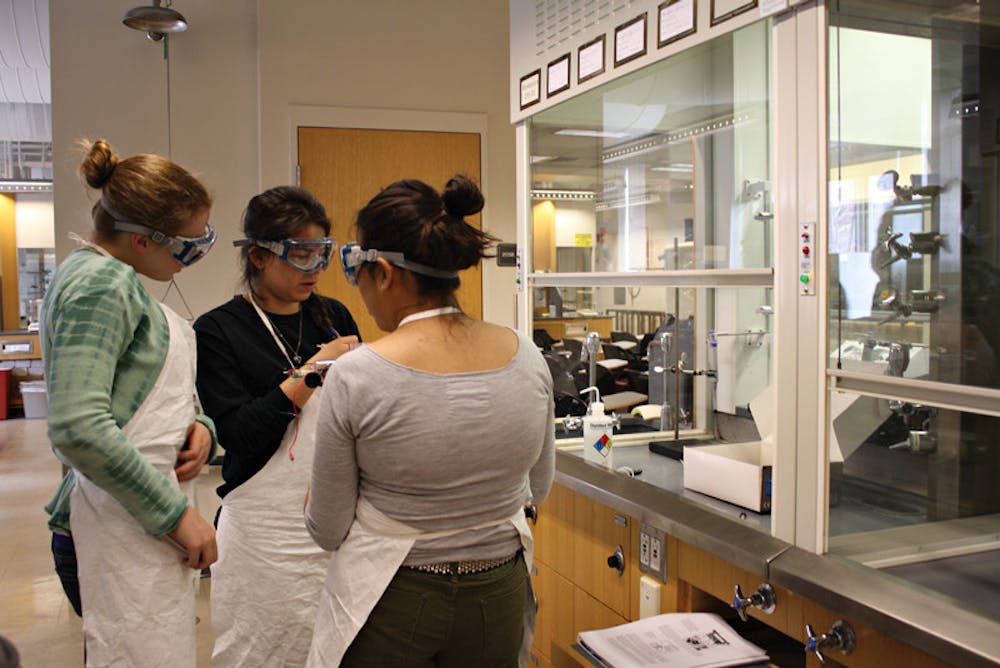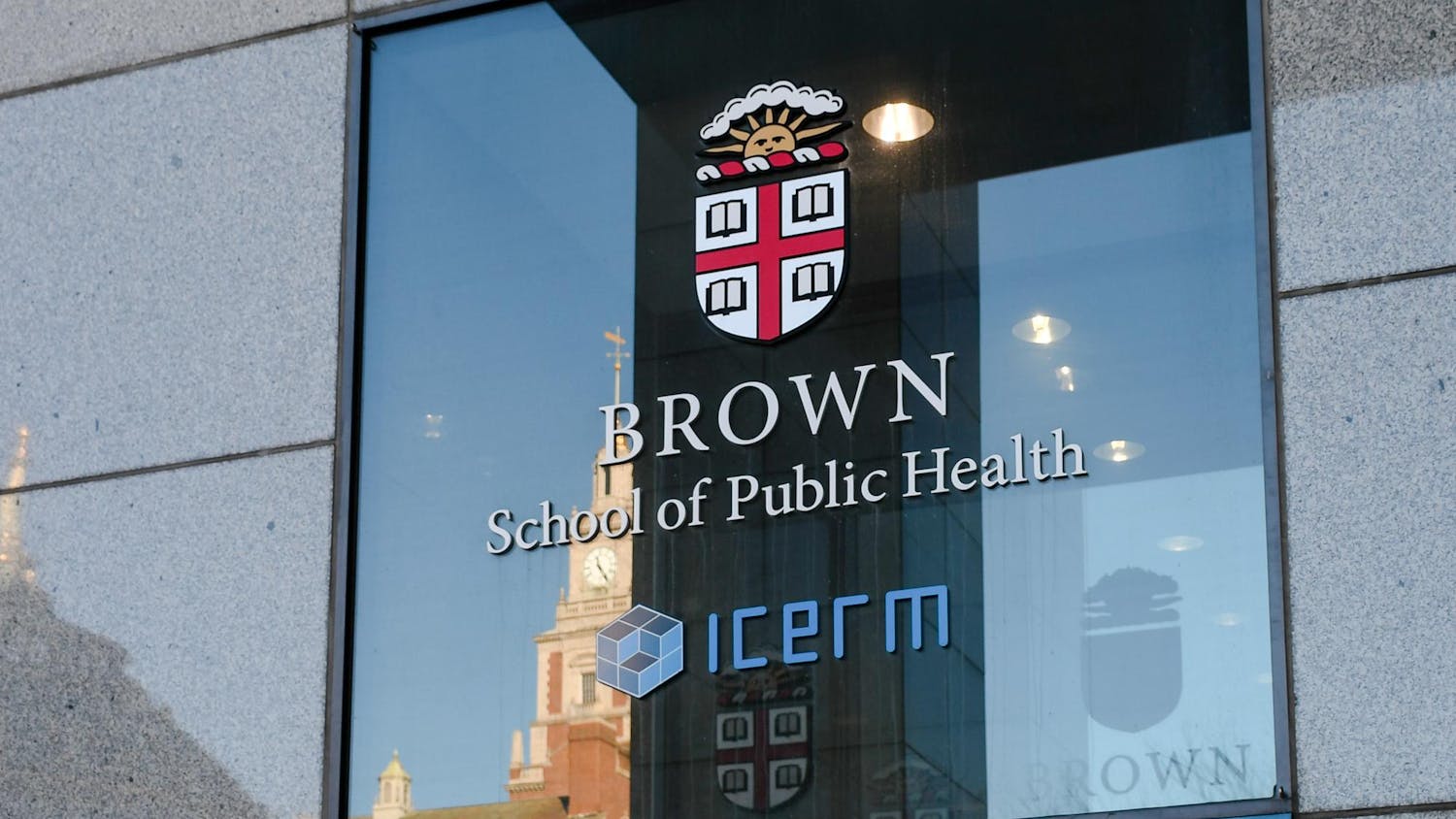Every week Claire Walker ’16 attends section, completes reading, studies for a quiz and writes a report. But Walker does not earn a full course credit for these activities — they are mandatory components of the laboratory portion of CHEM 0350: “Organic Chemistry.”
The lab “takes up more time than any other class,” Walker said.
As students gear up to register for next semester’s courses, many must take into consideration the additional and often unrecognized commitment lab courses require, and fill their carts accordingly.
Despite the time commitment, many students, not just in organic chemistry, have trouble seeing the connection between a course’s lab and lecture portions.
“Studying for the lab would in no way help me prepare for the test,” Walker said.
The perceived disconnect
Many students expressed frustration at the irrelevance of the material learned in labs to the lecture components of courses. Professors recognize these frustrations but contend that labs still impart crucial skills to students.
John Palmer ’16 said the lab for CHEM 0330: “Equilibrium, Rate and Structure” often focused on “one small thing” mentioned in lecture that was unimportant to know for exams.
Zach Zuchowski ’17, who is currently enrolled in CHEM 0350, said the course’s lab also often seems “out of order compared to what we (are) learning in class.”
But Jody Hall, manager of undergraduate laboratories, said some former students of BIOL 0200: “The Foundations of Living Systems” thought the labs and lectures were “extremely well connected,” while others thought the labs had nothing to do with lecture material. Hall is co-teaching the course this semester while Professor of Biology Kenneth Miller ’70 P’02 is on sabbatical.
“If the student approaches (a course) expecting that there’s going to be correlation and there isn’t, then that’s disappointing,” Hall said.
For some courses, like CHEM 0350, the connections between the lab and lecture “might not be obvious to somebody who is just starting out,” said J. William Suggs, associate professor of chemistry and biochemistry. But the connections may become clear as students gain more knowledge and lab experience.
Kathleen Hess, a senior lecturer in chemistry who is in charge of the labs for CHEM 0350 and CHEM 0360: “Organic Chemistry,” noted that at the beginning of the sequence, it is difficult for students to do experiments directly related to the lectures “because they haven’t learned how to work with molecules.”
Once mid-semester passes, students begin doing experiments more closely related to the lectures, Hess said.
“Finally, at lab six of seven, we are doing a reaction that … we learned about in class,” Walker said.
Once students are in CHEM 0360 they are “ready to go,” Hess said, adding that the second semester’s labs are more lecture-related. She added that she collaborates with the lecture instructors to plan out the labs, which she tries to make “as complementary as possible” to lecture topics.
Despite students’ concerns, Suggs said the best way to talk about organic chemistry might not be the best way to demonstrate it. “There’s no logical reason to assume that they’d follow the same narrative,” he said.
Students acknowledged that some classes have a more direct connection to their labs. Palmer is currently enrolled in CSCI 0180: “Computer Science: An Integrated Introduction,” a course with a two-hour lab that is “pretty closely related” to the lecture, he said.
Lectures introduce topics that students explore “hands-on” in the lab, Palmer said, adding that concepts on the homework are usually “exactly related” to what students do in the lab beforehand.
Credit change debate
Some students also question why they must put in additional time to laboratory courses without receiving additional credit.
“We at Brown have the philosophy that (the lab) is part of the course,” Hess said.
There has been talk about making the lab a separate course in the past, Suggs said, which would mean that students could optionally register for just one course component.
Many other schools follow this model. For example, the University of Michigan has completely separate lab and lecture courses, wrote John Wolfe, associate chair for undergraduate education in the department of chemistry at Michigan, in an email to The Herald.
“Each of these courses has a separate instructor, and the grades are separate as well,” Wolfe wrote. The two courses are “strongly recommended” to be taken together, but it is not required, he added.
About seven years ago, the University discussed having students receive an additional half credit for the lab component of CHEM 0350, Suggs said. “We really thought it was going to happen, but then various people around the University pointed out that some Brown students like to take five courses,” he added. The half-credit course would cause these students to go over the five-credit maximum for the semester.
Had it been up to the department, the credit change “probably would have happened,” Suggs said, adding that faculty members believe most people who take CHEM 0350 or 0360 are not enrolled in five credits’ worth of courses.
But “Brown is all about freedom,” Suggs said. “Students have the option to do their education the way they think makes sense for them, and I certainly support that.”
Walker said CHEM 0350 and 0360 labs would not be as frustrating if credit were given for the lab itself. “I think it’s definitely something they should consider changing,” she said.
Some courses outside of the chemistry department do have optional half-credit labs, Palmer said, citing CSCI 1730: “Introduction to Programming Languages” and CSCI 1729: “Programming Languages Lab” as examples.
Students at Michigan who do not take the lecture and lab classes together often refrain from doing so because they have “complicated schedules” or they previously dropped the lecture and are repeating it, Wolfe wrote.
But Michigan’s chemistry department conducted a study that showed students in general chemistry courses that took lecture and lab courses concurrently performed better in both courses than students who took them separately, Wolfe wrote.
Though Suggs supports giving students additional credit for labs, he does not think lectures and labs should be taken separately, calling the practice “100 percent wrong.”
At Brown, Suggs said, the “rare cases” when students took lecture before lab ended in disaster.
But some students may be interested in taking only the lecture, and the lab’s large time commitments may dissuade students from taking certain science courses as they are currently offered, Zuchowski said.
Walker said she loves the lectures and concepts in CHEM 0350 but that the lab component makes the course “unpleasant.”
“You hate it when it’s happening,” Suggs said. “But once it’s over, you sort of look back and say, ‘I am happy that I was able to make use of that experience.’”

ADVERTISEMENT




